Packed HEAPS into 6 months in stunning New Zealand and met great friends Past Review
By A student (Environmental Science., The University of Texas at Austin) - abroad from 06/26/2013 to 11/15/2014 with
University of Otago, New Zealand: Study Abroad Programme
Very worthwhile. Gained a lot of confidence, independence, good friends, awesome experiences with nature, and greater ability to live in a household with people. It broke the ice for traveling and made me feel like I can go anywhere I want to.
Review Photos
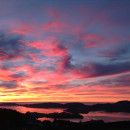
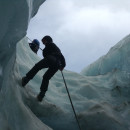
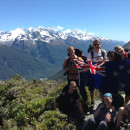
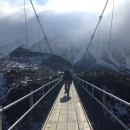
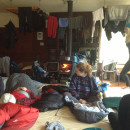
Personal Information
| How much international exposure did you have prior to this program? | None |
Review Your Program
|
* Overall educational experience
Academic rigor, intensity, resources, etc. |
I was not used to professors not having office hours and also the grading scheme of high percentage final exams was different. |
|
* Host Country Program Administration
On-site administration of your program |
The administration for international students at Otago is amazing! They do so much for you as an international! Any questions are quickly answered. |
|
* Housing:
How satisfied were you with your living arrangements? |
The flats are very cold in winter (this is usual in NZ, the insulation and heating is not like what we are used to in the U.S.). But Uniflats takes care of everything you need! If you need any dishes or cookware or if something breaks, they will immediately replace it or send someone out to have a look (usually that same day) with no hassle. Uniflats also puts on lots of events, puts together intramural sports teams for the residents, and has very friendly staff. In their flatting program, you live with other international students and a "Kiwi Host". I loved living in a complex with so many other international students AND Kiwis. It was easy to become friends with your neighbors, complex mates, and flatmates. |
| * Food: |
There are plenty of places to get groceries within a 15 minute walk of campus and most Uniflats. Two main grocery stores (Countdown and New World) and Veggie Boys for cheap produce. The brands are different, which takes some getting used to. And the eggs are not refrigerated (but don't be worried). We mostly cooked meals at the flat but went out for lunch sometimes (a favorite spot was Velvet Burger on Tuesdays for their 2 for 1 deal). |
|
* Social & Cultural Integration:
How integrated did you feel with the local culture? |
I didn't meet as many Kiwis as I did other international students, but like I said before, the University puts a lot of effort into getting international students to cultural events. And just going around with the Kiwis that I did meet (my Kiwi Host and Kiwi mentor) showed me a lot of things! Many people also took a Maori culture class. |
|
* Health Care:
How well were health issues addressed during the program? |
I had two experiences with pink eye that was going around campus. Getting an appointment at the university health center and then medication afterward was very easy and payed for by the international insurance. |
| * Safety: |
New Zealand in general is a very safe country. People hitchhike all the time and I was never afraid walking around at night or in cities. On and around campus they have Campus Watch officers walking around all the time who look after the students. Many people don't even lock their front doors, although we did have one case of theft in the complex during the semester (but this is very uncommon). Most safety related issues I saw involved people endangering themselves after drinking too much. There was one incident where my guy flatmates were harassed/confronted by some thugs in a van while walking down the street, but this encounter was quickly over. |
| If you could do it all over again would you choose the same program? |
Yes
|
Finances
|
* Money: How easily were you able to live on a student's budget?
(1 = not very easy/$200+ on food & personal expenses/week, 2.5 = $100/week, 5 = very easily/minimal cost) |
If I just wanted to stay on campus and hang around town like the average student, it would have been easy to stay in budget. However all the expenses associated with extra travel (fuel is over twice as expensive, rental cars/car maintenance, backpackers and hut passes, and cost of certain activities like tours) caused me to spend more than I thought I would. Alcohol is also very expensive there (an unnecessary but socially pressured cost). |
| Not including program expenses, about how much money did you spend on food and other expenses each week? | Food= about $35-40 (we all pitched in to cook flat dinners together 5 nights a week, about $5 a meal), power for the flat about $50 a month, other expenses varied...weekend trips usually resulted in about $25-$50 in fuel (even after splitting between car passengers). |
| Do you have any general money-saving tips for future study abroad participants? | If you are tight on money, don't buy into or fall for the typical tourist traps (an $85 ferry ride or $75 entry to a cave) because you can usually find similar things in less popular areas or alternative activities that are just as fun for much less $. Example: I paid $70 for a tour of the Waitomo glow worm gave which has the most glow worms in one place- it was very cool, but later I went on a hike at night in a valley with glow worms all over the walls which was also very cool (and free!). Another example: paid $85 for a ferry boat ride in Milford Sound- some of my friends stayed back and fished off of the pier in Milford Sound. They had a great time, were still surrounded by the beautiful landscape, and didn't spend a dime. Also- carpool and split the gas for big trips, keep track of your fuel to split even on short trips because they add up when suddenly there is an empty tank and someone has to fill it (about $100 worth to fill a car up). Use travel websites like transfercar (for free rental cars), bookme (for cheaper tickets to events), and websites for cheap flights. Also trademe is kind of like their ebay. |
Language
| * Did your program have a foreign language component? | No |
Other Program Information
|
* Where did you live?
Select all that apply |
|
|
* Who did you live with?
Select all that apply |
|
|
* Who did you take classes with?
Select all that apply |
|
| About how many local friends did you make that you will likely keep in touch with? |
A Look Back
| * What did you like most about the program? |
|
| * What could be improved? |
|
| * What do you know now that you wish you knew before going on this program? | The things that were and weren't worth the money. I spent a few hundred dollars on compulsive things that I look back on as unnecessary. That a good multi day tramping backpack and efficient sleeping bag would be very necessary. Do not overpay for a used car! You can get a decent one for under $1,500. We paid $2,200 for ours and had problems with it. |
Reasons For Studying Abroad
| To help future students find programs attended by like-minded individuals, please choose the profile that most closely represents you. |
The Avid AdventurerThe wardrobe you packed was better suited for a semester of camping than club hopping. Outdoorsy, you might forgo a crazy night out for an early all-day adventure. You'd rather take in the rich culture of an old town than the metropolis of a modern city, but for you getting off the grid is ideal. |
Individual Course Reviews
| Course Name/Rating: |
Environmental Management |
| Course Department: | Geography |
| Instructor: | Mike Hilton, Teresa Konlechner |
| Instruction Language: | English |
| Comments: | Was challenging in the density of policy content, but very interesting because it focused on specifically New Zealand policy. We took several interesting field trips. The teachers were knowledgeable but the teaching style was a little dry. I participated in class less often because I was not as familiar as most other people with the situations being talked about (since they focused on New Zealand). We had a large group project where we assessed an environmental issue in New Zealand and how it is dealt with. We also had an exam over the Resource Management Act (a key piece of environmental legislation in NZ). We also had lab exercises that were usually completable in lab. |
| Credit Transfer Issues: | No problems, I got an environmental policy credit at my home university which I needed. |
| Course Name/Rating: |
Global Marine Systems |
| Course Department: | Marine Science |
| Instructor: | Will Rayment |
| Instruction Language: | English |
| Comments: | The lab exercises could be challenging, mostly because they were a little disorganized. But we took really cool field trips and did field exercises. We were assessed by a final lab book and essay style exams. |
| Credit Transfer Issues: | This course seemed like it had plenty of lab work but it will only count for a lower level oceanography credit |
| Course Name/Rating: |
Democratic Promise: The USA to 1900 |
| Course Department: | History |
| Instructor: | Russell Johnson |
| Instruction Language: | English |
| Comments: | I thought this would be a different perspective of a Kiwi teaching U.S. history, but the professor was American and it felt just like a history class in the U.S. I probably participated more in class since in this case, I was more knowledgeable about certain things that we are taught since elementary school in the U.S. but were new to the Kiwis. |
| Credit Transfer Issues: | This credit transferred fairly easily. It is an obvious U.S. history course |








